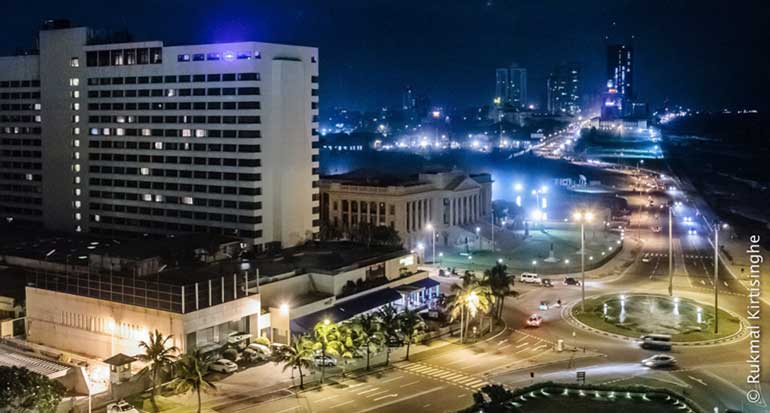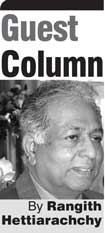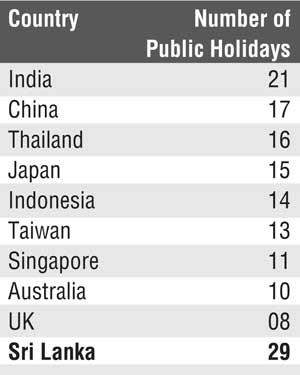Tuesday Feb 24, 2026
Tuesday Feb 24, 2026
Saturday, 9 July 2016 00:00 - - {{hitsCtrl.values.hits}}

To become a ‘hub of all economic activities,’ we need discipline
 Even though Sri Lanka is small in size, our capacity to generate world, regional and local news has kept us along with the rest of the world. Some time we feel our general public is always hungry for exciting news. Unfortunately we are not generating much news showing our capabilities. Even we get heavily loaded with news generated especially by politicians which is not beneficial and most of the time it creates a bad image about the country.
Even though Sri Lanka is small in size, our capacity to generate world, regional and local news has kept us along with the rest of the world. Some time we feel our general public is always hungry for exciting news. Unfortunately we are not generating much news showing our capabilities. Even we get heavily loaded with news generated especially by politicians which is not beneficial and most of the time it creates a bad image about the country.
Our leaders have shown us from time to time that prosperity is waiting to bring us happiness and it is not very far! In the recent past our politicians have taken a few lessons from marketing. How to market themselves by delighting the entire population? Anyway as a senior private sector executive and a chamber person, I haven’t seen any of our political parties or leaders publicly speaking about our work ethic. They singlehandedly promised glory will be at our doorstep overnight as a miracle!
If I highlight a few examples of political taglines from the recent past, ‘Sri Lanka will be the wonder of Asia,’ ‘Star of South East Asia,’ ‘Hub of the entire region for all economic activities,’ ‘This is the largest venture this side of the Suez’ – in the 1960s this was a very common phrase used by all politicians, then it became shortened as ‘Best in Asia’.
All this is history but still there are certain issues that none of the political leaders have addressed. Though they haven’t come to a secret agreement, we do not even accidently see any national-minded person speaking on how to adopt and cultivate best practices in the work place and hunger to overtake the neighbouring country in efficiency and productivity. They are always very careful not to discuss these topics in public as a rule because they know it will have a direct adverse effect on their number of votes.
 A matter of holidays
A matter of holidays
The Sri Lankan politician has completely removed the word “Holidays” from their dictionary and vocabulary. The only thing we hear occasionally is our Labour Minister requesting the private sector also to follow suit after declaring an unscheduled Government holiday to make it a “long weekend,” etc. Luckily now we do not hear much of a cry making a request to add some more new holidays!
Why we are scared to take the right decision? Are we lacking the leadership quality of taking the right decision now? That will bring prosperity to the country in the future. We are very fond of taking decisions that will bring popularity overnight. This must have come from the recent advent of ‘Super Star Concept’ that is getting rooted among all generations thanks to mega FM channels.
The Government and its leaders must especially have the courage to take the right decision that will bring glory and smiles to the entire nation. They must take similar decisions at the beginning of their tenures. Then when they reach election time, they will realise how they have served the nation and voters will experience a different kind of political characters they will love to re-elect. People will get uses to seeing results and vote and it will help the nation to deviate from the present concept of going through a manifesto with promises of creating ‘heaven’ and vote. The manifesto itself ends up in a dustbin before the ink is dry.
Becoming a hub
It is time to talk about how we can become a ‘hub of all economic activities’. For this we need discipline, first and last. The day we become good, self-disciplined pedestrians and drivers, then we can say we are ready to convert Sri Lanka to another Singapore. This is the first lesson taught by great leader of Singapore late Lee Kuan Yew to Singaporeans and to the entire world.
“Lee eschewed populist policies in favour of pragmatic long-term social and economic measures. With meritocracy and multiracialism as governing principles, Lee made English the common language to integrate its immigrant society and to facilitate trade with the West, whilst mandating bilingualism in schools to preserve students’ mother tongue and ethnic identity. Lee’s rule was criticised, for curtailing civil liberties (public protests, media control) and bringing libel suits against political opponents. He argued that such disciplinary measures were necessary for political stability, which together with rule of law, were essential for economic progress” – Source Wikipedia.
Any nation will never march forward without best practices and good discipline. Discipline at the work place plus productivity and efficiency will bring glory to our country
Is our holiday culture affecting the change of required mindset and in turn is it affecting our GDP growth? Unfortunately I am not aware of any organisation or economist publishing a paper on how holidays can affect our GDP. I feel this is the best time to think about it and commence a nationwide dialogue.
With reference to holidays there are different views. Refer to the following quotation:
“For example, in 2003 a senior Indian Government official caused a stir when he claimed that a holiday syndrome is a major hurdle to the economic growth of that country (Financial Express, 2003). Too many holidays, especially by Government employees, were weakening India’s competitiveness in the telecom sectors, he argued. A study by Ramasamy, Yeung, and Au (2008) estimates the effects of holidays on domestic private consumption in Hong Kong, and finds that increasing holidays by a day a quarter raises private consumption significantly and consequently GDP also goes up by 0.34%.”
“China re-instated four traditional festivals that were banned during Mao’s socialist dispensation (hktdc.com, 2007). Evidence from the re-instatement of the four festivals shows an increase in consumer spending of up to 17% in 2007 from 15% the same time in 2006. In some cities retail sales increased by as much as 40% as a direct result of the Lunar New Year and other so-called golden week holiday celebrations” (China.org.cn, 2007). – Source: Holidays and Economic Growth of Nations –Vox Henrich Amavillah 2009.
Some seriously believe holidays will completely disturb economic growth. Some believe holidays are important to maintain a balance between work and family life, which will in turn bring productivity. Anyway when we scrutinise the public holiday figures, we can come to many conclusions. The table shows details of national holidays from some selected countries in the world.
When you have a glance at it automatically we can observe where we are. Our 29 days include 12 Poya days. The most significant point is that if you add our 29 public holidays with another 21 days of leave (Shop and office) and 104 weekends, it comes to 154 days. So we are working approximately 211 days i.e. just seven months? On these 211 days it is also questionable whether it is a full nine-hour work day. With this trend can we achieve our ‘new world’ and export-led growth?
Modifying holiday patterns
At least if we cannot review our holiday patterns, can we modify it in a manner that will increase our productivity and efficiency? Countries with fewer holidays has shown a growth in industrial production. In recent times countries have developed certain mechanisms to strike a balance between work and holidays.
Consider the following:
1. Can we plan a two-week-long vacation in April? For this the private sector must be allowed to use a quota from the authorised leave from their employees’ entitlement on mutual agreement. China after closing factories for one month for the New Year has still become the leading manufacturer in the world. So it is the time for the private sector to develop a dialogue with the Government and carry out a trial. Most Far East countries are moving towards this trend of seasonal long holiday patterns. This will generate more business in holiday travel, etc.
2. Allow the private sector to negotiate on leave – to reschedule leave when necessary in an industry in an operator-friendly manner. In China when a holiday falls on a weekday, they make adjustments to create a long weekend.
3. Buy back unutilised leave.
Now is the appropriate time to think about the above matters if we are seriously concerned about uplifting production, which will allow us to go global. I hope the above views will create a national dialogue on this serious issue, to which up to now no priority has been given by the Government or the private sector in a joint manner.
(The writer is a Past Chairman of the Ceylon National Chamber of Industries. He can be reached via [email protected].)